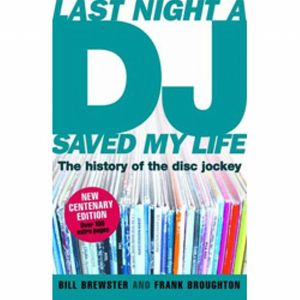Filter
Stock
Equipment
Format
Featured
Price
Back catalogue: Techno (Alles)
Juno's full catalogue of Techno (Alles)Cat: 895530 Rel: 22 Sep 22
DeForrest Brown, Jr.'s Assembling a Black Counter Culture presents a comprehensive account of techno with a focus on the history of Black experiences in industrialized labor systems
Notes: DeForrest Brown, Jr.'s Assembling a Black Counter Culture presents a comprehensive account of techno with a focus on the history of Black experiences in industrialized labor systems - repositioning the genre as a unique form of Black musical and cultural production.
Brown traces the genealogy and current developments in techno, locating its origins in the 1980s in the historically emblematic city of Detroit and the broader landscape of Black musical forms. Reaching back from the transatlantic slave trade to Emancipation, the Industrial Revolution, and the Great Migration from the rural South to the industrialized North, Brown details an extended history of techno rooted in the transformation of urban centers and the new forms of industrial capitalism that gave rise to the African American working class. Following the groundbreaking work of key early players like The Belleville Three, the multimedia output of Underground Resistance and the mythscience of Drexciya, Brown illuminates the networks of collaboration, production, and circulation of techno from Detroit to other cities around the world.
Assembling a Black Counter Culture reframes techno from a Black theoretical perspective distinct from its cultural assimilation within predominantly white, European electronic music contexts and discourse. With references to Theodore Roszak's Making of a Counter Culture, writings by African American autoworker and political activist James Boggs, and the "techno rebels" of Alvin Toffler's Third Wave, among others, Brown draws parallels between movements in Black electronic music and Afrofuturist, speculative, and Afrodiasporic practices to imagine a world-building sonic fiction and futurity embodied in techno.
DeForrest Brown Jr. is an Alabama-raised rhythmanalyst, writer, and representative of the Make Techno Black Again campaign. As Speaker Music, he channels the African American modernist tradition of rhythm and soul music as an intellectual site and sound of generational trauma. On Juneteenth of 2020, he released the album Black Nationalist Sonic Weaponry on Planet Mu. His written work explores the links between the Black experience in industrialized labor systems and Black innovation in electronic music, and has appeared in Artforum, Triple Canopy, NPR, CTM Festival, Mixmag, among many others. He has performed or presented work at Haus der Kulturen der Welt, Berlin; Camden Arts Centre, UK; Unsound Festival, Krakow; Sonar, Barcelona; Issue Project Room, New York; and elsewhere. Assembling a Black Counter Culture is Brown's debut book.
432 pages
5.5 x 8.25 inches
Paperback
Edition of 4000
… Read moreBrown traces the genealogy and current developments in techno, locating its origins in the 1980s in the historically emblematic city of Detroit and the broader landscape of Black musical forms. Reaching back from the transatlantic slave trade to Emancipation, the Industrial Revolution, and the Great Migration from the rural South to the industrialized North, Brown details an extended history of techno rooted in the transformation of urban centers and the new forms of industrial capitalism that gave rise to the African American working class. Following the groundbreaking work of key early players like The Belleville Three, the multimedia output of Underground Resistance and the mythscience of Drexciya, Brown illuminates the networks of collaboration, production, and circulation of techno from Detroit to other cities around the world.
Assembling a Black Counter Culture reframes techno from a Black theoretical perspective distinct from its cultural assimilation within predominantly white, European electronic music contexts and discourse. With references to Theodore Roszak's Making of a Counter Culture, writings by African American autoworker and political activist James Boggs, and the "techno rebels" of Alvin Toffler's Third Wave, among others, Brown draws parallels between movements in Black electronic music and Afrofuturist, speculative, and Afrodiasporic practices to imagine a world-building sonic fiction and futurity embodied in techno.
DeForrest Brown Jr. is an Alabama-raised rhythmanalyst, writer, and representative of the Make Techno Black Again campaign. As Speaker Music, he channels the African American modernist tradition of rhythm and soul music as an intellectual site and sound of generational trauma. On Juneteenth of 2020, he released the album Black Nationalist Sonic Weaponry on Planet Mu. His written work explores the links between the Black experience in industrialized labor systems and Black innovation in electronic music, and has appeared in Artforum, Triple Canopy, NPR, CTM Festival, Mixmag, among many others. He has performed or presented work at Haus der Kulturen der Welt, Berlin; Camden Arts Centre, UK; Unsound Festival, Krakow; Sonar, Barcelona; Issue Project Room, New York; and elsewhere. Assembling a Black Counter Culture is Brown's debut book.
432 pages
5.5 x 8.25 inches
Paperback
Edition of 4000
out of stock $23.22
Cat: 411973 Rel: 19 Jan 15
Book of a knowledgeable compilation of information and an intellectual resource, introducing a complete history of DJ, the new edition of chapters covering techno, acid house, Ibiza, jungle, UK garage and cosmic disco (600 pages, paperback, black & white)
Notes: The self-styled definitive history of the humble art of spinning plates of vinyl, the Last Night A DJ Saved My Life steps up to the turntables with worthy pretensions. The work of journalists Bill Brewster and Frank Broughton, who, between them, have worked on The Face, i-D, Rolling Stone and Musik, they certainly know their deep house from their speed garage. But while Last Night A DJ Saved My Life is an impressively knowledgeable compilation of information, they never quite decide whether this is an intellectual resource, a complete history, or if they're playing these records just for kicks.
So in the preface fun is poked at abstract nonsense about postmodern intertextuality and the pair thunder into well-reasoned, impassioned debate about the DJ being a modern-day shaman--pulse-racing stuff, which makes it all the more uncomfortable when it segues into an unremittingly dull chronological history of the invention of the record deck. The pace quickens with an excellent chapter on Northern Soul, and in hot pursuit follow impressive histories of the reggae, hip-hop and disco genres. But then Acid House, perhaps Britain's most important musical evolution ever, is given short shrift and techno is dismissed over a mere ten pages as house's swotty offspring. The term definitive, it seems, has been faded out of the mix.
The Last Night A DJ Saved My Life is no Bible for the penitent vinyl worshipper and its difficult chronology makes it an uncomfortable read. Still, if you think that Northern Soul records were made in Leeds and disco began with the Bee Gees, there's a wealth of knowledge here that'll put you right.
To celebrate 100 years of DJing, Bill Brewster and Frank Broughton have expanded and updated their classic account of the history of the disc jockey. The DJ was born on Christmas Eve, 1906 when Reginald Fessenden became the first person to play a record over the radio. A century later and the DJ is the central figure in popular music. From these humble talking jukebox origins to today's DJ superstars earning rock star salaries with a fanbase to match, the history of the DJ is fascinating and unpredictable. The story of these unlikely cultural icons takes the reader through the swinging sixties, through the sequinned revolution that was disco, via hip hop and house to mass-market global domination.
Bill and Frank's classic chronicle digs deep to find DJing started in 1906, the Nazis invented clubbing and Jimmy Savile should be a hero to all. Arguing that DJs not musicians are pop music's true revolutionaries, it details with love all the scenes that matter. The new edition is beefed up with entirely new chapters covering techno, acid house, Ibiza, jungle, UK garage and cosmic disco.
… Read moreSo in the preface fun is poked at abstract nonsense about postmodern intertextuality and the pair thunder into well-reasoned, impassioned debate about the DJ being a modern-day shaman--pulse-racing stuff, which makes it all the more uncomfortable when it segues into an unremittingly dull chronological history of the invention of the record deck. The pace quickens with an excellent chapter on Northern Soul, and in hot pursuit follow impressive histories of the reggae, hip-hop and disco genres. But then Acid House, perhaps Britain's most important musical evolution ever, is given short shrift and techno is dismissed over a mere ten pages as house's swotty offspring. The term definitive, it seems, has been faded out of the mix.
The Last Night A DJ Saved My Life is no Bible for the penitent vinyl worshipper and its difficult chronology makes it an uncomfortable read. Still, if you think that Northern Soul records were made in Leeds and disco began with the Bee Gees, there's a wealth of knowledge here that'll put you right.
To celebrate 100 years of DJing, Bill Brewster and Frank Broughton have expanded and updated their classic account of the history of the disc jockey. The DJ was born on Christmas Eve, 1906 when Reginald Fessenden became the first person to play a record over the radio. A century later and the DJ is the central figure in popular music. From these humble talking jukebox origins to today's DJ superstars earning rock star salaries with a fanbase to match, the history of the DJ is fascinating and unpredictable. The story of these unlikely cultural icons takes the reader through the swinging sixties, through the sequinned revolution that was disco, via hip hop and house to mass-market global domination.
Bill and Frank's classic chronicle digs deep to find DJing started in 1906, the Nazis invented clubbing and Jimmy Savile should be a hero to all. Arguing that DJs not musicians are pop music's true revolutionaries, it details with love all the scenes that matter. The new edition is beefed up with entirely new chapters covering techno, acid house, Ibiza, jungle, UK garage and cosmic disco.
out of stock $4.98

 USD
USD






